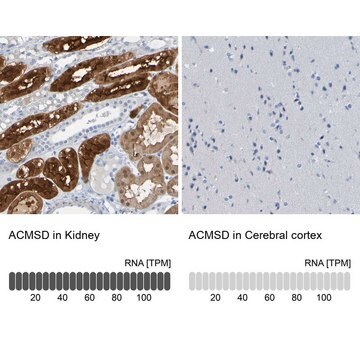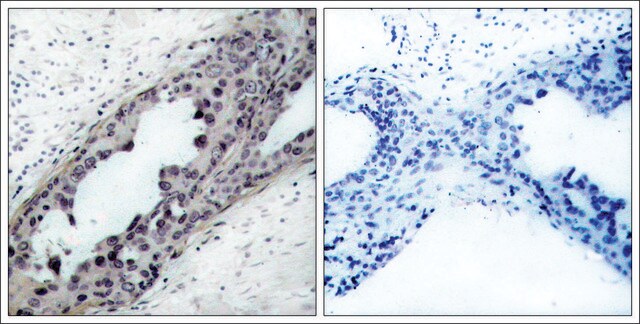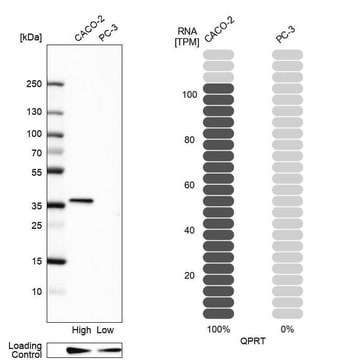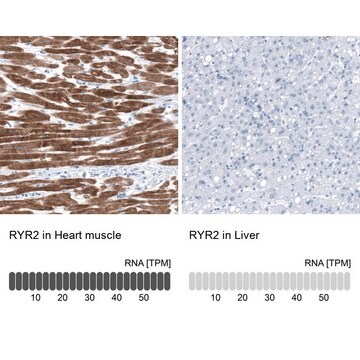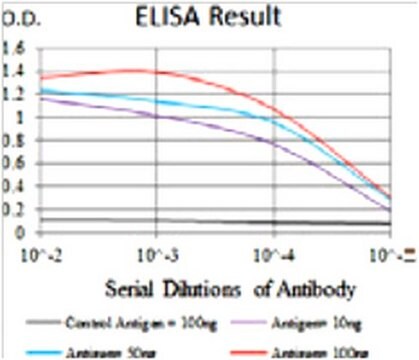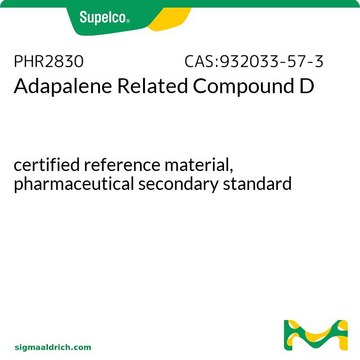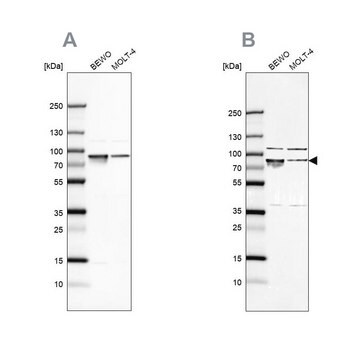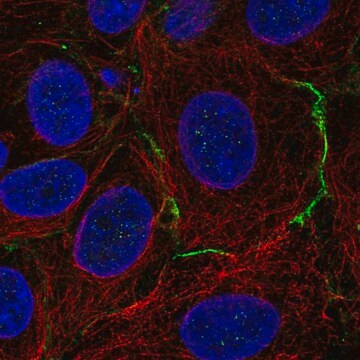推荐产品
生物源
rabbit
共軛
unconjugated
抗體表格
affinity isolated antibody
抗體產品種類
primary antibodies
無性繁殖
polyclonal
產品線
Prestige Antibodies® Powered by Atlas Antibodies
形狀
buffered aqueous glycerol solution
物種活性
human
加強驗證
recombinant expression
Learn more about Antibody Enhanced Validation
技術
immunoblotting: 0.04-0.4 μg/mL
immunohistochemistry: 1:200-1:500
免疫原序列
KGEAKLLKDGKVFRVVRENCWDPEVRIREMDQKGVTVQALSTVPVMFSYWAKPEDTLNLCQLLNNDLASTVVSYPRRFVGLGTLPMQAPELAVKEMERCVKELGFPGVQIGTHVNEWDLNAQELFPVYAAAERLKCSLFVHPW
UniProt登錄號
運輸包裝
wet ice
儲存溫度
−20°C
目標翻譯後修改
unmodified
基因資訊
human ... ACMSD(130013)
一般說明
ACMSD (α-amino-β-carboxymuconate-epsilon-semialdehyde decarboxylase) is an amidohydrolase, which is dependent on zinc for its activity. It is a 40kDa cytoplasmic protein.
免疫原
2-amino-3-carboxymuconate-6-semialdehyde decarboxylase recombinant protein epitope signature tag (PrEST)
應用
All Prestige Antibodies Powered by Atlas Antibodies are developed and validated by the Human Protein Atlas (HPA) project and as a result, are supported by the most extensive characterization in the industry.
The Human Protein Atlas project can be subdivided into three efforts: Human Tissue Atlas, Cancer Atlas, and Human Cell Atlas. The antibodies that have been generated in support of the Tissue and Cancer Atlas projects have been tested by immunohistochemistry against hundreds of normal and disease tissues and through the recent efforts of the Human Cell Atlas project, many have been characterized by immunofluorescence to map the human proteome not only at the tissue level but now at the subcellular level. These images and the collection of this vast data set can be viewed on the Human Protein Atlas (HPA) site by clicking on the Image Gallery link. We also provide Prestige Antibodies® protocols and other useful information.
The Human Protein Atlas project can be subdivided into three efforts: Human Tissue Atlas, Cancer Atlas, and Human Cell Atlas. The antibodies that have been generated in support of the Tissue and Cancer Atlas projects have been tested by immunohistochemistry against hundreds of normal and disease tissues and through the recent efforts of the Human Cell Atlas project, many have been characterized by immunofluorescence to map the human proteome not only at the tissue level but now at the subcellular level. These images and the collection of this vast data set can be viewed on the Human Protein Atlas (HPA) site by clicking on the Image Gallery link. We also provide Prestige Antibodies® protocols and other useful information.
生化/生理作用
ACMSD (α-amino-β-carboxymuconate-epsilon-semialdehyde decarboxylase) is involved in kynurenine pathway of tryptophan degradation. It produces α-aminomuconate-e-semialdehyde (AMS) by reacting with α-amino-β-carboxymuconate-ε-semialdehyde (ACMS). ACMS is very unstable and quickly converts to quinolinate, which in turn is an excitotoxin. Quinolinate is supposedly involved in the pathophysiology of neurodiseases such as Alzheimer′s disease (AD), epilepsy and Huntington′s disease. Therefore, mutations in ACMSD gene are linked with cortical myoclonus, epilepsy, and parkinsonism. This protein is also involved in the homeostasis of picolinic acid (PA), quinolinic acid (QA) and NAD. This enzyme determines whether tryptophan will be converted into PA or NAD through QA formation. It might also have potential for the treatment of cerebral malaria. This gene locus is also linked with Parkinson′s disease risk.
特點和優勢
Prestige Antibodies® are highly characterized and extensively validated antibodies with the added benefit of all available characterization data for each target being accessible via the Human Protein Atlas portal linked just below the product name at the top of this page. The uniqueness and low cross-reactivity of the Prestige Antibodies® to other proteins are due to a thorough selection of antigen regions, affinity purification, and stringent selection. Prestige antigen controls are available for every corresponding Prestige Antibody and can be found in the linkage section.
Every Prestige Antibody is tested in the following ways:
Every Prestige Antibody is tested in the following ways:
- IHC tissue array of 44 normal human tissues and 20 of the most common cancer type tissues.
- Protein array of 364 human recombinant protein fragments.
聯結
Corresponding Antigen APREST72114
外觀
Solution in phosphate-buffered saline, pH 7.2, containing 40% glycerol and 0.02% sodium azide
法律資訊
Prestige Antibodies is a registered trademark of Merck KGaA, Darmstadt, Germany
未找到合适的产品?
试试我们的产品选型工具.
儲存類別代碼
10 - Combustible liquids
水污染物質分類(WGK)
WGK 1
閃點(°F)
Not applicable
閃點(°C)
Not applicable
個人防護裝備
Eyeshields, Gloves, multi-purpose combination respirator cartridge (US)
Michael A Nalls et al.
Lancet (London, England), 377(9766), 641-649 (2011-02-05)
Genome-wide association studies (GWAS) for Parkinson's disease have linked two loci (MAPT and SNCA) to risk of Parkinson's disease. We aimed to identify novel risk loci for Parkinson's disease. We did a meta-analysis of datasets from five Parkinson's disease GWAS
Jose Felix Martí-Massó et al.
Journal of molecular medicine (Berlin, Germany), 91(12), 1399-1406 (2013-08-21)
Familial cortical myoclonic tremor and epilepsy is a phenotypically and genetically heterogeneous autosomal dominant disorder characterized by the presence of cortical myoclonic tremor and epilepsy that is often accompanied by additional neurological features. Despite the numerous familial studies performed and
Shin-Ichi Fukuoka et al.
The Journal of biological chemistry, 277(38), 35162-35167 (2002-07-26)
Quinolinate (quinolinic acid) is a potent endogenous excitotoxin of neuronal cells. Elevation of quinolinate levels in the brain has been implicated in the pathogenesis of various neurodegenerative disorders, the so-called "quinolinate hypothesis." Quinolinate is non-enzymatically derived from alpha-amino-beta-carboxymuconate-epsilon-semialdehyde (ACMS). Alpha-amino-beta-carboxymuconate-epsilon-semialdehyde
Silvia Garavaglia et al.
The FEBS journal, 276(22), 6615-6623 (2009-10-22)
The enzyme alpha-amino-beta-carboxymuconate-epsilon-semialdehyde decarboxylase (ACMSD) is a zinc-dependent amidohydrolase that participates in picolinic acid (PA), quinolinic acid (QA) and NAD homeostasis. Indeed, the enzyme stands at a branch point of the tryptophan to NAD pathway, and determines the final fate
我们的科学家团队拥有各种研究领域经验,包括生命科学、材料科学、化学合成、色谱、分析及许多其他领域.
联系技术服务部门

